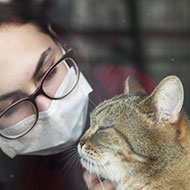UK cat contracts COVID-19 from owners

Those who are self-isolating with COVID-19 are being advised to restrict contact with their pets.
The virus responsible for COVID-19, SARS-CoV-2, has been detected in a pet cat in England for the first time, the UK's chief veterinary officer has confirmed.
A statement issued by Defra today (27 July) said the infection was confirmed following tests at the Animal and Plant Health Agency (APHA) laboratory in Weybridge on Wednesday 22 July.
A private vet initially diagnosed the cat with feline herpes virus. However, the sample was also tested for SARS-CoV-2 as part of a research programme.
Follow-up samples tested at the APHA laboratory in Weybridge confirmed the cat was also co-infected with SARS-CoV-2, the virus known to cause COVID-19 in humans.
Defra stressed that all available evidence suggests that the cat contracted COVID-19 from its owners who had previously tested positive for the disease. The cat and its owners have since made a full recovery, and there was no transmission to other animals or people in the household.
Chief Veterinary Officer Christine Middlemiss said: “Tests conducted by the Animal and Plant Health Agency have confirmed that the virus responsible for COVID-19 has been detected in a pet cat in England. This is a very rare event with infected animals detected to date only showing mild clinical signs and recovering within in a few days.”
She added: “There is no evidence to suggest that pets directly transmit the virus to humans. We will continue to monitor this situation closely and will update our guidance to pet owners should the situation change.
Responding to the announcement, BVA president Daniella Dos Santos issued advice for animal owners, urging those who are self-isolating with symptoms to restrict contact with their pets and to practise good hygiene.
“While pet owners may be worried by this news, we’d like to emphasise that there continues to be no evidence that infected pets can pass Covid-19 to their owners, “ she said. “There have been a tiny number of cases of Covid-19 in domestic animals worldwide and in all cases, it appears likely that the transmission was from infected humans to animals.
“We have been in touch with vets in Government and the local veterinary practice for information and have been informed that the cat only showed mild clinical signs and has since made a full recovery.”



 The Veterinary Medicines Directorate (VMD) is inviting applications from veterinary students to attend a one-week extramural studies (EMS) placement in July 2026.
The Veterinary Medicines Directorate (VMD) is inviting applications from veterinary students to attend a one-week extramural studies (EMS) placement in July 2026.